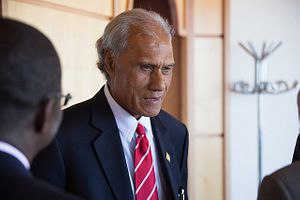The political reforms of less than a decade ago in Tonga experienced a setback last week when King Tupou VI dismissed the government of Prime Minister ‘Akilisi Pohiva. The king has yet to provide his reasoning for the dismissal of the government, however, it seems that he was acting on advice from the speaker of the parliament, who brought a number of concerns about the Pohiva government to the king’s attention.
Upon the king’s dismissal of the Pohiva government, the speaker, Lord Tu’ivankō issued a statement outlining the advice he provided to the King that is seen to have encouraged the king’s decision. The speaker claimed that Pohiva had made a number of unconstitutional moves that included signing international agreements — the Convention on the Elimination of all Forms of Discrimination Against Women, and the Pacific region’s PACER Plus free trade agreement — without the consent of the king, and attempting to remove the king’s power to appoint the attorney-general and police commissioner.
It seems the speaker was becoming increasingly concerned that the government was planning to remove the constitutional authority of the king to endorse legislation, interpreted as a power grab by Pohiva, who was a long-time pro-democracy campaigner before becoming prime minister. These constitutional matters were placed alongside previous concerns about financial mismanagement, nepotism, and general incompetence within the government, allegations that led to a No Confidence motion being directed at Prime Minister Pohiva in February. Pohiva survived the motion due to his support in the legislature.
Concerns that the dismissal may cause civil unrest in the country have so far proven unfounded. Pro-democracy riots in 2006 burnt much of the Tongan capital, Nuku’alofa. These riots were the impetus for democratic reforms that removed much of the power of the king and the country’s nobility, and paved the way of Pohiva to become prime minister in 2014.
Tongan society retains its own unique social structure based on a hierarchy of the king, the land-owning nobles, and the “commoners,” who make up the vast majority of the country’s 110,000 people. Pohiva is a “commoner” and the first person from this social group to be elected prime minister. This is perceived to be causing some of the tensions with the country’s traditional ruling elite (of which the speaker is a member).
The major democratic reforms that were implemented in 2010 had the king relinquish most of his legislative powers. Alongside this, the legislative body was realigned with the number legislators in the 26-seat chamber elected by “commoners” expanded from nine to 17. The remaining nine seats were reserved for members of the country’s nobility. Previously the prime minister and cabinet were appointed by the king, but the reforms also created a system where these positions would be elected by the members of the parliament instead.
It would seem likely that the country’s traditional elite are highly suspicious of Pohiva, as Tonga’s first democratically elected prime minister from a commoner background. However. Pohiva has not helped himself by running a government that continually seemed to engage in poor decision-making. This alongside his drive to continue to dilute the power of the country’s traditional elite, has resulted in the king’s dismissal of his government.
Tonga remains a fledgling democracy, and the dissolution of the country’s parliament by the king can be seen as hiccup along the path towards greater democratic consolidation. Although the democratic reforms of 2010 were able to provide a greater capacity for representation for those outside the country’s traditional elite, the nobility still maintain significant power within Tonga’s governing structures, and will be unlikely to relinquish this further without some resistance.
While the country’s legislature has been dissolved, the Pohiva government will continue in a caretaker capacity until a new election can be held. This will take place on November 16, a year ahead of the election previously scheduled for November 2018. If Pohiva is able to regain his position as prime minister, he might then have a public mandate to redistribute power in the country, but he also may have learned from his dismissal last week that to meet with the least resistance, such a goal is best achieved incrementally.
































